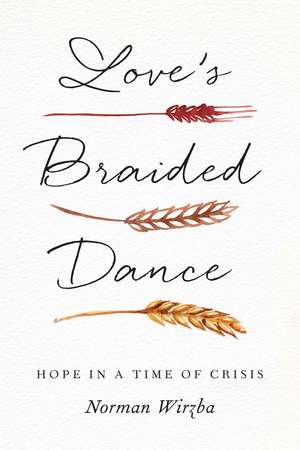Love's Braided Dance: Hope in a Time of Crisis
Autor Norman Wirzbaen Limba Engleză Hardback – 29 oct 2024
In this series of meditations, Norman Wirzba recasts hope not as something people have, like a vaccine to prevent pain and trouble, but as something people do. Hope evaporates in conditions of abandonment and abuse. It grows in contexts of nurture and belonging. Hope ignites when people join in what Wendell Berry calls “love’s braided dance”—a commitment to care for one another and our world.
Through personal narratives and historical examples, Wirzba explores what sustains hope and why it so often seems absent from our vision of the future. The vitality of hope, he maintains, depends on a collective commitment to care for the physical world (its soils and waters, plants and animals, homes and neighborhoods) and to promote the moral, aesthetic, and spiritual ideals that affirm life as good, beautiful, and sacred.
Engaging with such contemporary topics as climate change, AI and social media, and the intensifying refugee crises and drawing on the wisdom of James Baldwin, Archbishop Desmond Tutu, Robin Wall Kimmerer, Martha Graham, and others, Wirzba offers a powerful argument for hope as a way of life in which people are intimately and practically joined with all the living.
Preț: 138.78 lei
Nou
Puncte Express: 208
Preț estimativ în valută:
26.56€ • 27.66$ • 22.45£
26.56€ • 27.66$ • 22.45£
Carte disponibilă
Livrare economică 17 februarie-03 martie
Livrare express 31 ianuarie-06 februarie pentru 38.59 lei
Preluare comenzi: 021 569.72.76
Specificații
ISBN-13: 9780300272659
ISBN-10: 0300272650
Pagini: 200
Dimensiuni: 140 x 216 x 22 mm
Greutate: 0.34 kg
Editura: Yale University Press
Colecția Yale University Press
ISBN-10: 0300272650
Pagini: 200
Dimensiuni: 140 x 216 x 22 mm
Greutate: 0.34 kg
Editura: Yale University Press
Colecția Yale University Press
Recenzii
Listed in Englewood Review of Books’ “Most Anticipated Books for Christian Readers,” Fall 2024
“Wirzba encourages readers to find ways to embrace a rooted and hopeful stance even in modern urban life. Therein lies the greatest value of the present book: It is a manifesto for human flourishing in the face of the relentless onslaught of AI and encroaching technology.”—Nadya Williams, The Dispatch
“Again and again, Wirzba returns to the theme of finding hope in the yearning for a more loving world, one that propels people to give to others and to sustain the earth’s creative life forces.”—Religion News Service
“Love’s Braided Dance offers hope for hard times. . . . It is strikingly honest, and in its honesty it can speak to readers who fear for the future amid our fraught present landscape. In a culture all too familiar with cheap, saccharine hope, Wirzba offers a refreshing reminder of the future we can build together.”—Lilia Ellis, Christian Century
“A work of compressed, concentrated moral energy, full of stories that make vital connections and show how radical transformation happens.”—Rowan Williams, 104th Archbishop of Canterbury
“Peering straight into the heart of the darkness of our violent world, Norman Wirzba invites us into a riveting journey of hope. Love’s Braided Dance choreographs a movement for a sacred dance of forgiveness with love and courage.”—Makoto Fujimura, artist and author of Art and Faith: A Theology of Making
“In this beautifully written but unassuming book, Norman Wirzba takes us, his readers, lovingly by the hand while urging us to do the same with one another. Amidst the clamour of a world on fire, Wirzba’s counsel is as wise as it is compassionate. May the seeds of hope it plants take root and grow!”—Tim Ingold, University of Aberdeen
“Wirzba encourages readers to find ways to embrace a rooted and hopeful stance even in modern urban life. Therein lies the greatest value of the present book: It is a manifesto for human flourishing in the face of the relentless onslaught of AI and encroaching technology.”—Nadya Williams, The Dispatch
“Again and again, Wirzba returns to the theme of finding hope in the yearning for a more loving world, one that propels people to give to others and to sustain the earth’s creative life forces.”—Religion News Service
“Love’s Braided Dance offers hope for hard times. . . . It is strikingly honest, and in its honesty it can speak to readers who fear for the future amid our fraught present landscape. In a culture all too familiar with cheap, saccharine hope, Wirzba offers a refreshing reminder of the future we can build together.”—Lilia Ellis, Christian Century
“A work of compressed, concentrated moral energy, full of stories that make vital connections and show how radical transformation happens.”—Rowan Williams, 104th Archbishop of Canterbury
“Peering straight into the heart of the darkness of our violent world, Norman Wirzba invites us into a riveting journey of hope. Love’s Braided Dance choreographs a movement for a sacred dance of forgiveness with love and courage.”—Makoto Fujimura, artist and author of Art and Faith: A Theology of Making
“In this beautifully written but unassuming book, Norman Wirzba takes us, his readers, lovingly by the hand while urging us to do the same with one another. Amidst the clamour of a world on fire, Wirzba’s counsel is as wise as it is compassionate. May the seeds of hope it plants take root and grow!”—Tim Ingold, University of Aberdeen
Notă biografică
Norman Wirzba is the Gilbert T. Rowe Distinguished Professor of Christian Theology at Duke Divinity School, as well as director of research at Duke University’s Office of Climate and Sustainability. His books include Agrarian Spirit: Cultivating Faith, Community, and the Land and This Sacred Life: Humanity’s Place in a Wounded World. He lives in Hillsborough, NC.
Descriere
A moving exploration of the place of hope in the world today, drawing on agrarian principles
